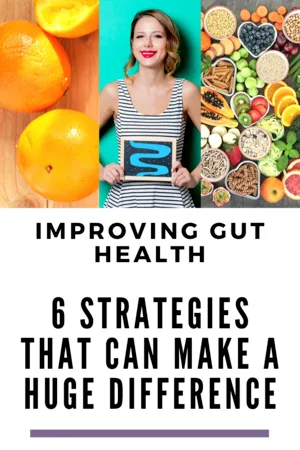When it comes to feeling better and resolving unwanted symptoms like pain, inflammation, constipation, pelvic organ prolapse, chronic infections, fatigue, and more, we are often told that there is some “magic pill” for the specific symptom.
Constipation? Take this stool softener.
Pain? Take this pain reliever.
Fatigue? Have some caffeine.
I think you get the idea!
But what if I told you that just by improving your gut health, you could make a difference in ALL of these things and more! An unhealthy gut can be a major cause or contributor to all of these issues.
Maximizing gut health can:
-
Reduce inflammation (as a pelvic health expert who treats chronic pain conditions, calming down systemic inflammation is a MUST)
-
Improve immune function (70% of our immune cells are in our gut!)
-
Resolve constipation (which can increase pelvic organ prolapse, inflammation systemically due to reabsorption of toxins, and even increase bladder leakage for children and adults)
-
Improve energy
-
Improve weight management
-
Help balance hormones
So instead of giving you a list of drugs to manage symptoms, how about giving you a list of simple things we can actually DO to improve the function of our gut?
Below I will show you 6 things you can implement NOW to improve the health of your gut and help you feel SO much better.
1). CHEW YOUR FOOD
That’s right. In order to get the full nutritional value out of the hopefully healthy foods we are eating, we actually have to chew MUCH more thoroughly than is typical for the busy adult.
Ofen we are quickly eating a meal before leaving for work or school, or have a limited lunch break, or before heading out the door at night to take a kid to soccer practice.
The stomach does not have teeth. It relies on our mouth to do that job before the food gets to it.
In order to properly break down an almond? It takes 40 chews!
So slow down, enjoy the flavors, and chew THOROUGHLY before swallowing.
This can help proper digestion, improve nutrient absorption, and add to a happier gut.
2). EAT A FIBER RICH DIET
Think leafy greens, veggies, apples, oranges, and whole grains. The more variety the better as a flourishing gut microbiome thrives on this variety.
I would highly recommend working with a dietician, nutritionist or naturopath when it comes to detailed advice on an ideal diet for you. But you CAN be sure that you reduce processed food and increase fresh or frozen fruits and veggies with every meal.
3). TAKE A PROBIOTIC
With all of the things that we consume that are toxic to happy gut bacteria and the antibiotics that we take from time to time, the good bacteria in our gut could use a boost. While there are a gazillion probiotics on the market and one can become quickly overwhelmed with the right one to choose, I have a couple tips on this.
-
Consult with a naturopath
-
If it comes directly from the manufacturer to your door, it’s already well above the ones in the store… who knows how long the ones at a store sat on the shelf and what preservatives had to be added to keep on the shelf.
-
If you have any bladder pain history, avoid the ones that are high in histamine. This can further irritate your bladder.
-
Take it regularly for at least a month. If you don’t see an improvement in regularity or symptoms or have adverse reactions, then move on to try a different one.
4). AVOID FOODS THAT ARE TOXIC TO THE GUT
Though the list of foods that are suggested to avoid may be large, a few simple categories may be easier to omit or limit.
-
Sugar (Increases the production of yeast as this is it’s primary food. Overgrowth of Candida (yeast) can crowd out the good bacteria)
-
Artificial sweeteners (that diet coke can be downright toxic to the good bacteria… sorry)
-
Processed Food (emulsifiers that are used in heavily processed food can result in low-grade inflammation and increase in obesity)
-
Soy (has been shown to reduce key bacteria in the gut that are needed for a healthy gut balance: Bifidobacteria and Lactobacillus)
5). RESOLVE LOW STOMACH ACID
Many people suffer from low stomach acid that can result in poorly digested food and result in a buildup of bacteria in the stomach. Symptoms of low stomach acid can include heartburn, diarrhea, constipation, nausea, and more.
You can work with a naturopath to test for this issue to be sure. Especially if you have symptoms of what feels like heartburn. Ironically, you could be taking a lot of antacid and need the OPPOSITE!
Ways to improve stomach acid include:
-
Chew your food thoroughly
-
Eat fermented veggies like sauerkraut and pickles
-
Drink a small amount of diluted apple cider vinegar in the morning before breakfast (some even do this before every meal)
6). SUPPLEMENTS THAT CAN ALSO BE VERY HELPFUL FOR CONSTIPATION
I have found that MANY of my clients suffer from constipation either continuously or periodically. Things like stress, travel, lack of fiber or food sensitivities can all contribute to this. And unfortunately, the #1 way that we get rid of toxins in our bodies, is through our bowel movements. The longer that the stool stays in our body, the more our body reabsorbs the very toxins we were trying to remove.
For clients that have symptoms of pelvic organ prolapse, I tell them that they are no longer allowed to be constipated. Straining to have a BM can actually cause or worsen a prolapse.
If you have a child who wets the bed? Constipation is the #1 cause of these accidents. Working with a medical provider to resolve constipation could be the solution they NEED.
-
Magnesium glycinate or magnesium citrate can be very helpful to resolve constipation. We use Magnesium for over 300 processes in the body and it gets heavily used when we are stressed. (Mag Citrate is my personal favorite)
-
Work with a naturopath for guidance on this, but a simple way to titrate this supplement is to take the smallest dose before bed and see if you notice improved BM the next day. If not? Increase to 2 capsules the next night and so on. When your bowel movement is the perfect soft banana consistency, then you have taken the amount you need.
-
For kids: I have found a magnesium lotion for kids that I can apply to their feet when they are too young to take a pill.
-
Vitamin C can also be very helpful for constipation. Even better, is finding a magnesium that comes with Vit C. My favorite is Plexus brand.
As a pelvic health specialist, I am often guiding my patients on ways to help their body function optimally with basic diet and lifestyle modifications. I am regularly referring to my local naturopaths to be able to test things further and provide further guidance, but the strategies above are super simple and holistic.
When working with a holistic pelvic physical therapist like myself, you will find that we talk about WAY MORE than a few basic exercises. Whether you are working through resolving pelvic or back pain, bladder issues, recovering from pregnancy, pelvic organ prolapse and more, we will work to treat you as a WHOLE PERSON, and NOT just a diagnosis.
Realize that this and all other blog post publications should never replace actual medical diagnosis and treatment by your healthcare team. Posts like this can actually be a great conversation starter with your healthcare team!



